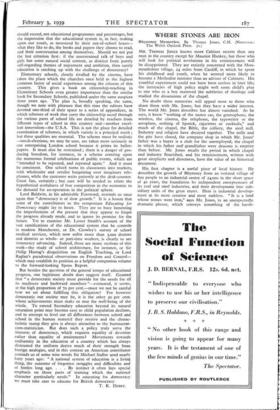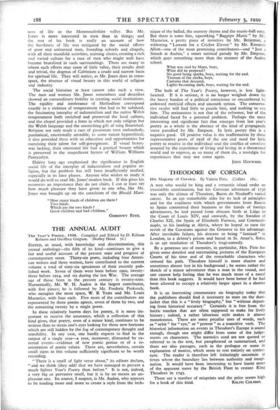WHERE STONES ARE IRON Rhymney Memories. By Thomas Jones, C.H.
(Newtown: The Welsh Outlook Press. 5s.) MR. THOMAS JONES knows more Cabinet secrets than any man in the country except Sir Maurice Hankey, but those who will look for political revelations in his reminiscences will be disappointed. They are entirely concerned with the Mon- mouthshire village, 24 miles from Cardiff, in which he spent his childhood and youth, when he seemed more likely to become a Methodist minister than an adviser of Cabinets. His youthful experiences could not have been useless in later life; the intricacies of high policy might well seem child's play to one who as a boy mastered the subtleties of theology and studied the dissensions of the chapel.
No doubt these memories will appeal most to those who share them with Mr. Jones; but they have a wider interest. The world Mr. Jones describes has almost vanished. As he says, it knew " nothing of the motor car, the gramophone, the wireless, the cinema, the telephone, the typewriter or the aeroplane, nothing of lipstick, cigarettes or cocktails," and much of the chapel, the Bible, the colliery, the steel mill. Industry and religion have decayed together. The mills and the pits have closed, the company shop in which Mr. Jones' father was a buyer is a club for the unemployed; the chapel in which his father and' grandfather were deacons is emptier than before. Mr. Jones recalls the period in which chapel and industry flourished, and his reminiscences, written with great simplicity and directness, have the value of an historical document.
His first chapter is a useful piece of local history. He describes the growth of Rhymney from an isolated village of boo people to an industrial centre of 24,000 in the short space of 4o years, the foundation by independent entrepreneurs of its coal and steel industries, and their development into sub- sidiary units of the great trusts. Here is industrial develop- ment at its most creative and most ruthless. " It is a land whose stones were iron," says Mr. Jones, in an unexpectedly dramatic phrase, which conveys something of the harsh-
ness of life in the Monmouthshire valley. But Mr.
Jones is more interested in men than in things; and the rest of his book is really an account of how the harshness of life was mitigated by the social efforts of poor and unlearned men, founding schools and chapels, with all their manifold activities, training choirs, creating a rich and varied culture for a race of men who might well have become brutalised in such surroundings. There are many to whom such efforts may seem of little value, their results drab and trivial, the dogmas of Calvinism a crude and narrow basis for spiritual life. They will notice, as Mr. Jones does in retro- spect, the absence of visual beauty in this world of religion and industry.
The social historian at least cannot take such a view. The men and women Mr. Jones remembers and describes showed an extraordinary fertility in creating social institutions.
The rigidity and intolerance of Methodism correspond exactly to a violence of temperament that had to be subdued, the fascinating interplay of industrialism and the native Welsh temperament both enriched and preserved the local culture, and the chapel provided a form in which not only religion but the Welsh language and the astonishing gift of song flourished. Religion not only made a race of passionate men melancholy, puritanical, emotionally unstable, to some extent hypocritical; it also provided them with an education and opportunities for exercising their talent for self-goveriunent. If visual beauty was lacking, their emotional life had a poetical beauty which is preserved in the magnificent hymns of William Williams Pantycelyn.
Halevy long ago emphasised the significance in English social life of the interplay of industrialism and popular re- ligion, but the problem has still been insufficiently studied, especially in its later phases. Anyone who wishes to study it would do well to read Mr. Jones' modest book. If this gives his memories an importance they do not claim, I can at least say how much pleasure they have given to one who, like Mr.
Jones was brought up on the catechism of the Rhodd Mam:
"How many kinds of children are there? Two kinds.
Which are the two kinds ?
Good children and bad children."
GORONWY REFS.











































 Previous page
Previous page